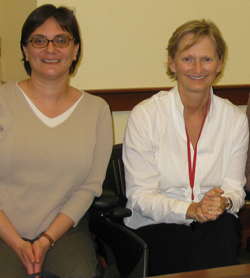Asking the Challenging Questions
Doctoral student Ellen Livingston helps high school kids grapple with challenging documentary films
Is peace “feminine”? Is war “masculine”? What do women bring to the peace table? Do they bring something different from men, and, if so, why? Why have women been under-represented in the peace-making process in most historical settings? And…who writes history, anyway?
Those are just a few of the questions posed by the Discussion Guide for “Pray the Devil Back to Hell,” a documentary film released in 2008 that tells the extraordinary story of how women in Liberia, fed up with their pre-teenage sons being abducted to serve as soldiers in the country’s horrific civil war, mounted a protest that helped end the conflict and bring Africa’s first democratically elected female head of state to power.
The film, by Abigail Disney and Gini Reticker, was voted best documentary of the Tribeca Film Festival and received rave reviews from The New York Times and other publications. But it’s the Discussion Guide, written by TC doctoral student Ellen Livingston, that may ultimately do as much or more to bring the story and its messages home to young people in American schools.
“The whole issue of child soldiers is really disturbing, and most high school students in this country aren’t aware that kids their own age and younger are forced to do this in many parts of the world,” says Livingston, a student and instructor in TC’s Social Studies Education program. “It’s wonderful that this film got made, but a lot of times teachers are afraid to introduce something like this because it raises such challenging issues, and then they don’t know what to do with them. ‘Okay, I show my kids this film – and then what?’ If we give them a framework for discussion, hopefully it increases the chance that they’ll show the film.”
Livingston was asked to work on the “Pray the Devil” project by her advisor, Margaret Crocco, who two years ago led the creation of “Teaching the Levees,” a curriculum keyed to director Spike Lee’s documentary on Hurricane Katrina and its aftermath. That effort, on which Livingston also worked (she contributed a chapter to the 100-plus page curriculum and has blogged about New Orleans to keep teachers aware of doings there), has brought many more filmmakers to Crocco’s door, enabling her to hand off projects to colleagues and students.
By all accounts, Livingston, a former Miami Herald reporter and social studies teacher, proved the right choice for the job.
“I sat down with Ellen, did a big download of my thinking, and she ultimately produced something far richer than what I’d given her,” says Disney. “More importantly, she turned it into something a teacher could digest. Her understanding of the kind of time teachers have available, and of the kind of material they find useful, was absolutely invaluable.”
Livingston herself calls both the film and the experience of creating the study guide “amazing.”
“This was the chance to help tell a story that otherwise would just have been lost, because it wasn’t fully acknowledged by many of the people directly involved in it,” she says. “People in power often don’t take ordinary women and their actions seriously. That’s partly because it didn’t occur to the so-called important people that what these women had done was of central importance. But it’s also because recognizing the contributions of ordinary people has political consequences.”
Since this past summer, Livingston has been working with Crocco on yet another project, “Let Freedom Swing,” a film being created by The Documentary Group (founded by former ABC producers Kayce Freed Jennings and Tom Yellin) about the affinities between jazz and democracy.
“Even when I was a high school teacher, my favorite part of the job was creating curriculum materials that interested students,” she says. “I’m interested in women’s issues, African American history and music.” But the common denominator, she says, is “material that hits on things you can’t be passive about. You have to become involved and ask challenging questions.”
For more on TC's Margaret Crocco, Ellen Livingston and colleagues that are bringing social studies into the 21st century, see the Fall 2009 TC Today article, “Taking Democracy Live” at http://www.tc.edu/news/article.htm?id=7275
Published Monday, Jan. 11, 2010
